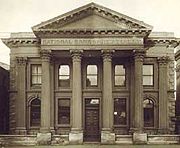- Mutual savings bank
-
For mutual banks, see mutualism (economic theory).Types of banksCentral bank
Advising bank · Commercial bank
Community development bank
Cooperative bank · Credit union
Custodian bank · Depository bank
Export credit agency
Investment bank · Industrial bank
Merchant bank · Mutual savings bank
National bank · Offshore bank
Postal savings system
Private bank · Retail Bank
Savings and loan association
Savings bank · Universal bank
more...Bank cardsBanking termsLoan · Money creation
Automatic teller machine
Bank regulation · Anonymous banking
Islamic banking · Private banking
Ethical bankingA mutual savings bank is a financial institution chartered by a central or regional government, without capital stock, that is owned by its members who subscribe to a common fund. From this fund claims, loans, etc., are paid. Profits after deductions are shared between the members. The institution is intended to provide a safe place for individual members to save and to invest those savings in mortgages, loans, stocks, bonds and other securities and to share in any profits or losses that result. The members own the business.
Contents
History
The institution most frequently identified as the first modern savings bank was the “Savings and Friendly Society” organized by the Reverend Henry Duncan in 1810, in Ruthwell, Scotland. Rev. Duncan established the small bank in order to encourage his working class congregation to develop thrift. European voluntary organizations and “friendly societies” provided the inspiration for their state incorporated American counterparts.
These first savings banks were envisioned as philanthropic endeavors, designed to uplift the poor and working classes. The banks were started by philanthropists, who took on the positions of savings bank trustees, managers, and directors as opportunities to teach the working class the virtues of thrift, and self-reliance by allowing them the security to save their money. The first incorporated US mutual savings bank was the Provident Institution for Savings, in Boston. Its 1816 charter was the first government legislation in the world to safeguard savings banks.
 Mutual savings banks are common in New England. New Bedford Institution For Savings was founded in 1825, and converted from mutual to stock status in 1987.
Mutual savings banks are common in New England. New Bedford Institution For Savings was founded in 1825, and converted from mutual to stock status in 1987.
Since the 1970s, when the industry was deregulated, thousands of mutual savings banks have been converted into stock ownership companies, raising more than $40 billion. In 2010, only about 600 remained.[1] These conversions have often resulted in large financial rewards for top bank executives.[2]
Use and design
Mutual savings banks were designed to stimulate savings by individuals; the exclusive function of these banks is to protect deposits, make limited, secure investments, and provide depositors with interest. Unlike commercial banks, savings banks have no stockholders; the entirety of profits beyond the upkeep of the bank belongs to the depositors of the mutual savings bank. Mutual savings banks prioritize security, and as a result, have historically been characteristically conservative in their investments. This conservatism is what allowed mutual savings banks to remain stable throughout the turbulent period of the Great Depression, despite the failing of commercial banks and savings and loan associations.
References
- ^ David Englander (December 18, 2010). "Like Money in the Bank". Barron's. http://online.barrons.com/article/SB50001424052970203319504576019503765673040.html?mod=BOL_twm_fs.
- ^ Saul Hansell (January 25, 1994). "Regulators Thwart Plan for Big Payouts In Bank Conversion". The New York Times. http://select.nytimes.com/gst/abstract.html?res=F20714FB3A540C768EDDA80894DC494D81&pagewanted=1.
See also
External links
Cooperative banking Types See also Cooperatives and Mutual organizations Types of
cooperativesBy governanceBy purposeBuilding cooperative · Student housing cooperative · Housing society · (Egalitarian) · Intentional communityMutual educationHealth insurance cooperativeFood cooperative · Recycling cooperativeIdentity Political and
economic theoriesKey theorists History and
geographyOrganizations See also Categories:- Cooperatives
- Banks
- Mutual organizations
- Cooperative banking
Wikimedia Foundation. 2010.

